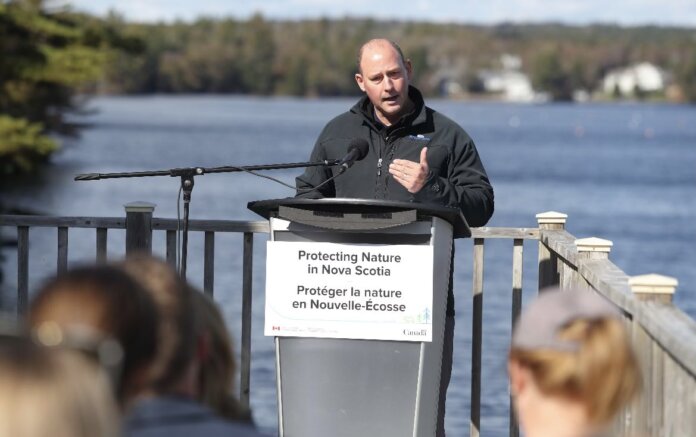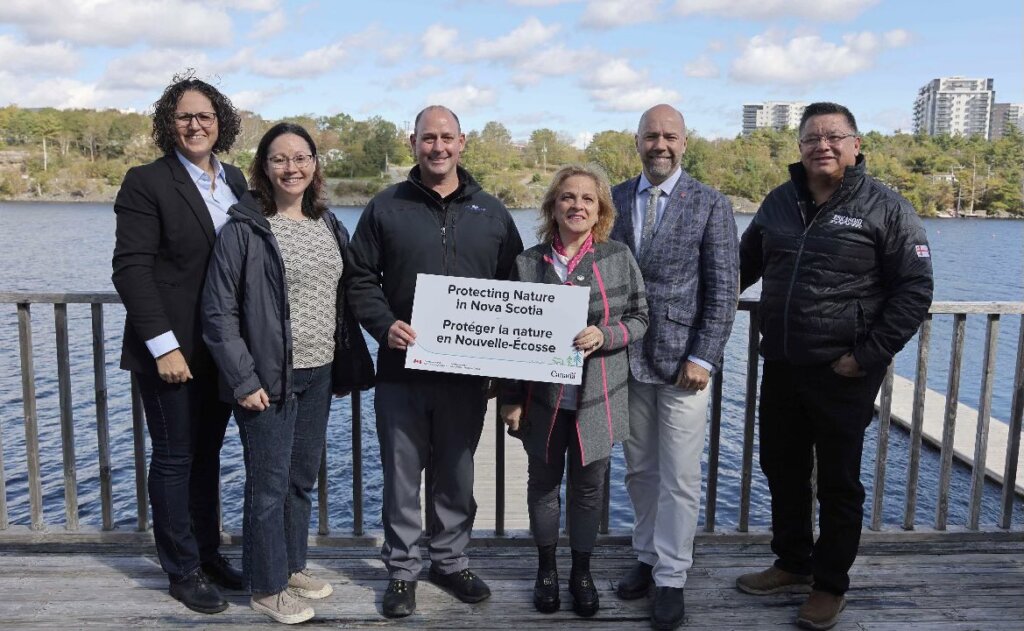
From a federal government release
HALIFAX: The governments of Canada and Nova Scotia say a Canada-Nova Scotia Nature Agreement show the two are working together to protect and conserve biodiversity, habitat, and species at risk in Nova Scotia.
Recently, Halifax West MP Lena Metlege Diab, and Timothy Halman, Minister of Environment and Climate Change for Nova Scotia, announced the Canada–Nova Scotia Nature Agreement to advance nature conservation and protection across the province.
Representatives of the Mi’kmaq of Nova Scotia also attended the announcement.
This unique collaboration will support the implementation of the Nature Agreement and all partners will work toward its target outcomes, including support for Mi’kmaq-led nature priorities and initiatives.
ADVERTISEMENT:
The Government of Canada will invest up to $28.5 million over three years to implement the Agreement and help protect nature. This will support the Mi’kmaq of Nova Scotia’s leadership in conservation, increase protection of sensitive habitats and recovery actions for species at risk and migratory birds, and protect and conserve new Crown and private land in Nova Scotia.
With the support of this Agreement, Nova Scotia aims to increase the amount of protected and conserved areas within the province by 82,500 hectares by March 2026.
Together, Canada and Nova Scotia will seek to accelerate the conservation of at least 20 percent of the total land and water mass in the province by 2030 to help achieve Canada’s goal of protecting 30 percent of its land and inland water by 2030.
It will take collective ambition to restore, conserve, and protect the natural safety net granted by biodiversity.
Through this Agreement, Nova Scotia will work to support Canada’s domestic and international biodiversity commitments, including the implementation of the Global Biodiversity Framework.
ADVERTISEMENT:
“Nova Scotia’s iconic landscapes and coastlines help define what it means to be Nova Scotian and are an integral part of the Canadian fabric. The Government of Canada is taking action to protect nature—our best ally in the fight against climate change and biodiversity loss.
“Together with the Government of Nova Scotia, we’re protecting more sensitive habitats, supporting the recovery of species at risk, and restoring ecosystems across the province.
“Moving forward, the Canada–Nova Scotia Nature Agreement will guide our actions, in partnership with Indigenous peoples, to conserve and protect nature in Nova Scotia.”
– Steven Guilbeault, Minister of Environment and Climate Change and Minister responsible for Parks Canada
“My constituents care deeply about preserving our natural environment and halting the loss of precious biodiversity. The Canada–Nova Scotia Nature Agreement is a culmination of our collective efforts to do just that.
“Together with the province of Nova Scotia and Mi’kmaq partners, we are going to do even more to protect land, water, and species at risk. This Agreement will serve as our roadmap.”
– Lena Metlege Diab, Member of Parliament for Halifax West
ADVERTISEMENT:

“Getting out in nature is vital for our physical and mental health, and protecting habitat for species at risk and other wildlife has never been more important, as we continue working to halt and reverse biodiversity loss.
The Canada–Nova Scotia Nature Agreement solidifies the ongoing commitment to conservation in Nova Scotia, and it will have lasting benefits for the flora, fauna, and people who live here.”
– Andy Fillmore, Member of Parliament for Halifax
“On behalf of the people of Nova Scotia, I want to thank Environment and Climate Change Canada for this funding and their ongoing partnership—together we are protecting more of our land and water which will benefit Nova Scotians today, and for generations to come.
“This Nature Agreement will help continue Nova Scotia’s national leadership in conservation by protecting nature and strengthening biodiversity and carbon capture and storage.
“We look forward to an ongoing partnership with the Mi’kmaq of Nova Scotia, land trusts, communities, and the federal government to achieve our shared vision and goals.”
– Timothy Halman, Minister of Environment and Climate Change for Nova Scotia
ADVERTISEMENT:
“Nova Scotia is a small province with a lot of competing interests for using our Crown land.
“Through land conservation efforts with our many partners and careful land-use planning, we can make sure plants and animals—especially species at risk—have healthy places to grow and thrive.”
– Tory Rushton, Minister of Natural Resources and Renewables for Nova Scotia
“Today is such a momentous occasion to see our government partners affirm the commitment to nature conservation protection in Nova Scotia.
“We, as Mi’kmaq people, have always prided our organizational principles toward Etuaptmumk, and this Agreement brings us much closer to that by working together to protect and conserve biodiversity, habitat, and species at risk in Nova Scotia.
“The collective goal toward protecting and conserving our land and water reaffirms our mutually collective goal of conserving land and water for the next seven generations.”
– Angeline Gillis, Executive Director of The Confederacy of Mainland Mi’kmaq
ADVERTISEMENT:
“Reconciliation with the land is something that we have always looked at as a crucial step toward expanding biocultural diversity, which is comprised of the diversity of life in all of its manifestations—biological, cultural, and linguistic.
“Language sits at the core of our cultural teachings, and it is one of the ways in which we are looking at re-establishing that connection with nature.
“The Nature Agreement is another tool that we can utilize that would allow us to establish that connection.
“Creating partnerships between the various government bodies enables us to do some long-term planning, guided by Mi’kmaq principles, that will benefit all parties involved, and most importantly, biocultural diversity.”
– Thomas J Johnson, Executive Director, Eskasoni Fish & Wildlife Commission























